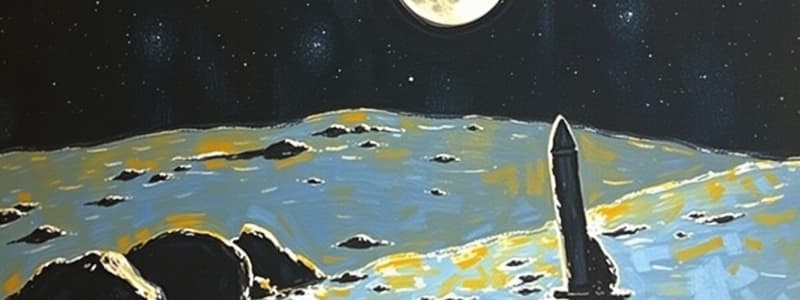Podcast
Questions and Answers
The Apollo 11 mission was launched on July 16, 1970.
The Apollo 11 mission was launched on July 16, 1970.
False (B)
Neil Armstrong was the first person to set foot on the Moon.
Neil Armstrong was the first person to set foot on the Moon.
True (A)
The lunar module of Apollo 11 was named Columbia.
The lunar module of Apollo 11 was named Columbia.
False (B)
Buzz Aldrin used a pen to fix a circuit breaker issue during the mission.
Buzz Aldrin used a pen to fix a circuit breaker issue during the mission.
Approximately 600 million people watched the Apollo 11 splashdown live.
Approximately 600 million people watched the Apollo 11 splashdown live.
Flashcards are hidden until you start studying
Study Notes
Apollo 11 Mission
- Launch date: July 16, 1969, from Kennedy Space Center, Florida.
- Astronauts: Neil Armstrong, Michael Collins, Edwin "Buzz" Aldrin.
- Mission significance: First successful human-operated mission to land on the Moon.
Journey Details
- Duration: Approximately three days to reach the Moon.
- Command module: Columbia, piloted by Michael Collins, remained in lunar orbit.
- Lunar module: Eagle, designed for two astronauts (Armstrong and Aldrin) to land on the Moon's surface.
Historic Moon Landing
- Neil Armstrong: First person to walk on the Moon.
- Buzz Aldrin: Joined Armstrong shortly after the landing, marking a significant moment in history.
- Surface exploration: Armstrong and Aldrin spent about two hours collecting samples and conducting experiments on the Moon.
Memorials Left on the Moon
- Items left behind: American flag, small gold pin shaped like an olive branch, a patch from the never-launched Apollo 1 mission.
- Personal belongings: Backpacks and equipment were also left on the lunar surface.
Key Challenges and Solutions
- Problem encountered: A circuit breaker was accidentally knocked loose, jeopardizing their return.
- Creative solution: Buzz Aldrin used a pen to push the circuit breaker back into place, enabling the engine to function.
Return to Earth
- Splashdown: The crew safely re-entered Earth's atmosphere, landing in the Pacific Ocean.
- Global impact: Approximately 600 million people worldwide watched the live expedition, celebrating the achievement of human exploration.
Questions Raised
- Post-moon exploration: Inquiry about future missions to other planets and missions to continue human exploration beyond the Moon.
Apollo 11 Mission
- Launch occurred on July 16, 1969, from Kennedy Space Center, Florida.
- Crew members included Neil Armstrong, Michael Collins, and Edwin "Buzz" Aldrin.
- This mission marked humanity's first successful landing on the Moon.
Journey Details
- The journey to the Moon took approximately three days.
- The command module, named Columbia, was piloted by Michael Collins and remained in lunar orbit.
- The lunar module, Eagle, was specifically designed for Armstrong and Aldrin to land on the Moon.
Historic Moon Landing
- Neil Armstrong became the first human to walk on the Moon on July 20, 1969.
- Buzz Aldrin followed Armstrong shortly after, creating an iconic moment in human history.
- Armstrong and Aldrin engaged in surface exploration for about two hours, collecting samples and conducting scientific experiments.
Memorials Left on the Moon
- Among the items left behind were the American flag, a small gold olive branch pin, and a patch from the unreleased Apollo 1 mission.
- Personal items, such as backpacks and equipment, were also abandoned on the lunar surface.
Key Challenges and Solutions
- A loose circuit breaker posed a risk to the crew's return to Earth.
- Buzz Aldrin creatively resolved the issue by using a pen to reinstate the circuit breaker, which allowed the engine to work.
Return to Earth
- The crew successfully splashed down in the Pacific Ocean after re-entering Earth's atmosphere.
- Approximately 600 million people globally watched the live broadcast of the mission, celebrating a landmark achievement in human exploration.
Questions Raised
- The mission sparked inquiries about future exploration, including missions to other planets and extending human presence beyond the Moon.
Studying That Suits You
Use AI to generate personalized quizzes and flashcards to suit your learning preferences.



